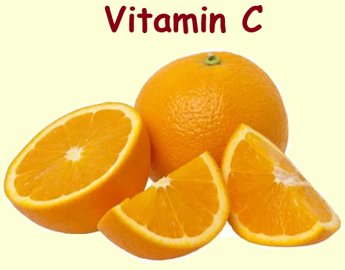Vitamin C Benefits, Sources, and Daily Requirements
Vitamin C, also called ascorbic acid, is a water-soluble vitamin and an essential micronutrient. It supports many important functions in the body. Vitamin C helps boost the immune system and also plays a key role in maintaining healthy skin, bones, and blood vessels. Overall, it is vital for good health and wellness.

Key Functions of Vitamin C
-
Collagen production – Vitamin C is vital for producing collagen, a protein that maintains healthy skin, tendons, ligaments, and blood vessels.
-
Wound healing and bone health – It speeds up wound repair, supports scar tissue formation, and helps maintain strong bones, teeth, and cartilage.
-
Iron absorption – Vitamin C boosts the body’s ability to absorb iron from plant-based foods, reducing the risk of iron deficiency anemia.
-
Antioxidant protection – As a powerful antioxidant, Vitamin C neutralizes free radicals, protecting cells from damage linked to aging, heart disease, and cancer.
-
Brain support – It aids in the production of neurotransmitters, improving communication between nerve cells and supporting healthy brain function.
How Much Vitamin C Do You Need Daily?
Since the body cannot produce Vitamin C, it must be obtained through diet or Vitamin C supplements. Recommended daily intake:
Can You Take Too Much Vitamin C?
Vitamin C is generally safe, but excessive intake (over 2,000 mg per day) may cause side effects like diarrhea, nausea, and stomach cramps due to poor absorption.
Proven Health Benefits of Vitamin C
✅ Immune System Support: Strengthens natural defenses and protects cells from oxidative stress.
✅ Eye Health: May slow progression of age-related macular degeneration (AMD) and reduce risk of cataracts with higher dietary intake.
✅ Cancer Prevention: Diets rich in fruits and vegetables high in Vitamin C are linked to lower cancer risk, though supplements alone may not show the same effect.
✅ Heart Health: Some studies suggest Vitamin C may help with blood pressure, but overall cardiovascular benefits remain modest.
✅ Antioxidant Protection: Helps combat oxidative stress, potentially slowing aging and reducing risk of chronic conditions like arthritis and neurodegenerative diseases.
Best Food Sources of Vitamin C
You can easily meet your Vitamin C requirements by eating a variety of fruits and vegetables.
-
Fruits Rich in Vitamin C:
-
Citrus fruits: Oranges, lemons, limes, and grapefruits
-
Berries: Strawberries, raspberries, blueberries, cranberries
-
Melons: Cantaloupe, watermelon
Vegetables Rich in Vitamin C:
Tips to Maximize Vitamin C Intake
-
Eat fresh, thoughly cleaned, raw fruits and vegetables whenever possible.
-
Choose steaming or microwaving instead of boiling to preserve Vitamin C.
-
Store foods properly, as prolonged storage and light exposure can reduce Vitamin C levels.
Adding Vitamin C-rich foods to your diet not only boosts immunity but also supports skin health, wound healing, and overall well-being. A balanced diet with plenty of fruits and vegetables is the best way to ensure you get enough of this essential nutrient.
Medical Disclaimer.
Read further on:
≺≺ What Is the Ketogenic Diet? Is the Keto Diet Right for Everyone?
≺≺ Why should I combine Avocados and Tomatoes?
≺≺ Cholesterol: What Does Diet Have to Do with It?
≺≺ What foods should people with high blood pressure avoid?
≺≺ Why is regular table salt considered unhealthy?
≺≺ Kosher Salt: A Kitchen Essential Explained.
≺≺ What makes Himalayan salt different from regular table salt?
≺≺ Which food is most associated with helping people live longer?
≺≺ Is Plant-Based Protein the Key to a Longer, Stronger Life?
≺≺ How important is fiber in the diet?
≺≺ What cardiovascular benefits do berries provide?
≺≺ What is the Okinawan diet? What is the secret behind Okinawan long life-expectancy?
≺≺ Ultra-Processed Foods: What They Are, Why They’re Harmful, and How to Cut Back.
≺≺ What grains have the lowest glycemic index?
≺≺ How Important Is Protein for Your Health?
≺≺ is your kid getting too much protein?
≺≺ What foods and vitamins are good for your skin?
≺≺ EWG’s- The Clean Fifteen: Fruits and Vegetables with the Lowest Pesticide Levels.
≺≺ What eating strategies work best for losing weight long term?
≺≺ How Do Sugary Meals and Beverages Harm Dental Health?
≺≺ Why Vitamin B12 Is Important for Your Health?
≺≺ What food is most effective for moderating blood sugar?
≺≺ What are antioxidants? How antioxidants in the fruits and vegetables help in preventing cancers and diseases?
≺≺ How can I reduce the risk of cancer-causing chemicals when cooking or grilling meat?
≺≺ What happens to my blood vessels when I gain weight?
≻≻ Watch this page for more such informative articles on Health, Nutrition, and Wellness.
≻≻-Back to Home page.
Further reading (External Links opens in new window):
≺≺- Harvard Health Publishing – Myths and truths about vitamin C.

